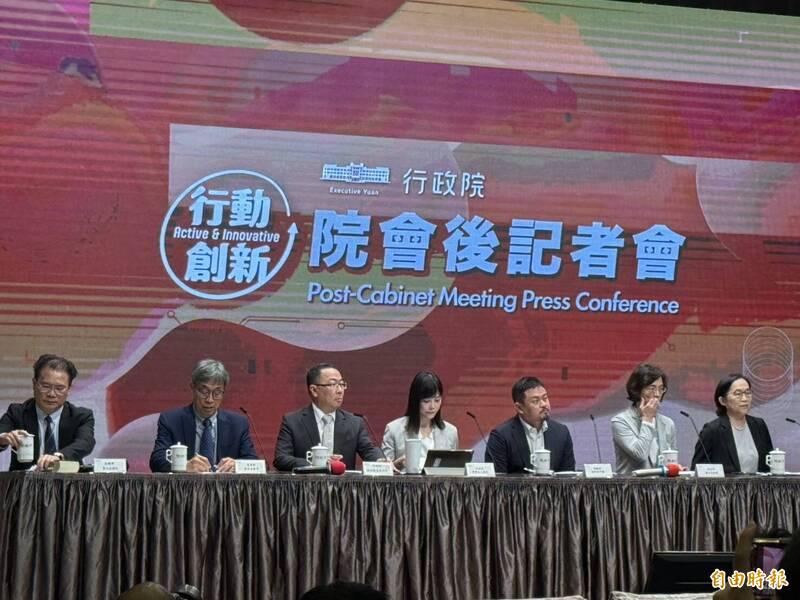The Executive Yuan today announced subsidies for pig farmers and other businesses in the pork industry affected by controls put in place due to an outbreak of African swine fever.
The Cabinet approved an industrial support and subsidy program for the hog industry to counter the effects of a 15-day ban on transporting and slaughtering pigs after Taiwan’s first case of African swine fever was detected in Taichung last week.

Photo: Chung Li-hua, Taipei Times
The ban greatly impacted pig farmers and related industries and affected the livelihoods of first-tier workers, Premier Cho Jung-tai (卓榮泰) said.
Cho has instructed the Ministry of Agriculture (MOA) and the Ministry of Economic Affairs to finish procedures and begin accepting subsidy applications as soon as possible.
The government said applications are expected to open on Monday.
Over the ban period of Oct. 23 to Friday next week, subsidies would be available as follows: NT$810 (US$26.36) per pig for feed costs due to delayed market entry, up to NT$200,000 per meat market, NT$15,000 per live pig wholesaler, NT$280 per head for slaughterhouses and NT$30,000 per traditional market stall, the Cabinet said.
For the 434 hog farms certified for using food waste as feed, subsidies of NT$300 per pig would be provided to cover the difference in feed cost as they transition away from using kitchen waste, the MOA said.
Fuel subsidies would also be available, starting at NT$8,000 for farms with 200 to 500 pigs and up to NT$18,000 for farms with more than 2,000 pigs, it said.
An additional NT$2,500 of compensation would be provided per pig if sows die due to overcrowding caused by mandated movement restrictions, it said.
Those who voluntarily report cases of African swine fever would also receive a NT$5,000 reward per report, it added.
In terms of financial support for the hog industry, first-time borrowers would receive six months of interest subsidies with interest rates capped at 1 percent, while existing borrowers can apply for a six-month payment deferral, during which the government would subsidize up to 1 percent of the interest rate, it said.
Each borrower could receive up to a combined NT$6 million in new and existing loans with no guarantee processing fees during the subsidized period, it added.
Meanwhile, Cho today directed the MOA to establish a centralized task force to assist in completing follow-up epidemiological tracing.
Every second counts in epidemic prevention, he said.
Taiwan has successfully prevented the epidemic from spreading, with measures announced on Sunday to extend the ban on transporting and slaughtering pigs and the use of kitchen waste as pig feed by 10 days, to end on Thursday next week, he said.
Moreover, a second stage of prevention measures were implemented, including tiered farm inspections, strengthened disinfection efforts, precise epidemiological tracing and further expansion of investigations, he said.
The measures were a cross-ministerial effort, he said, calling on the MOA, the Ministry of Environment, the Ministry of the Interior and local governments to work together to achieve the goal of zero African swine fever cases.

The manufacture of the remaining 28 M1A2T Abrams tanks Taiwan purchased from the US has recently been completed, and they are expected to be delivered within the next one to two months, a source said yesterday. The Ministry of National Defense is arranging cargo ships to transport the tanks to Taiwan as soon as possible, said the source, who is familiar with the matter. The estimated arrival time ranges from late this month to early next month, the source said. The 28 Abrams tanks make up the third and final batch of a total of 108 tanks, valued at about NT$40.5 billion

Two Taiwanese prosecutors were questioned by Chinese security personnel at their hotel during a trip to China’s Henan Province this month, the Mainland Affairs Council (MAC) said yesterday. The officers had personal information on the prosecutors, including “when they were assigned to their posts, their work locations and job titles,” MAC Deputy Minister and spokesman Liang Wen-chieh (梁文傑) said. On top of asking about their agencies and positions, the officers also questioned the prosecutors about the Cross-Strait Joint Crime-Fighting and Judicial Mutual Assistance Agreement, a pact that serves as the framework for Taiwan-China cooperation on combating crime and providing judicial assistance, Liang

A group from the Taiwanese Designers in Australia association yesterday represented Taiwan at the Midsumma Pride March in Melbourne. The march, held in the St. Kilda suburb, is the city’s largest LGBTQIA+ parade and the flagship event of the annual Midsumma Festival. It attracted more than 45,000 spectators who supported the 400 groups and 10,000 marchers that participated this year, the association said. Taiwanese Designers said they organized a team to march for Taiwan this year, joining politicians, government agencies, professionals and community organizations in showing support for LGBTQIA+ people and diverse communities. As the first country in Asia to legalize same-sex

MOTIVES QUESTIONED The PLA considers Xi’s policies toward Taiwan to be driven by personal considerations rather than military assessment, the Epoch Times reports Chinese President Xi Jinping’s (習近平) latest purge of the Chinese People’s Liberation Army (PLA) leadership might have been prompted by the military’s opposition to plans of invading Taiwan, the Epoch Times said. The Chinese military opposes waging war against Taiwan by a large consensus, putting it at odds with Xi’s vision, the Falun Gong-affiliated daily said in a report on Thursday, citing anonymous sources with insight into the PLA’s inner workings. The opposition is not the opinion of a few generals, but a widely shared view among the PLA cadre, the Epoch Times cited them as saying. “Chinese forces know full well that